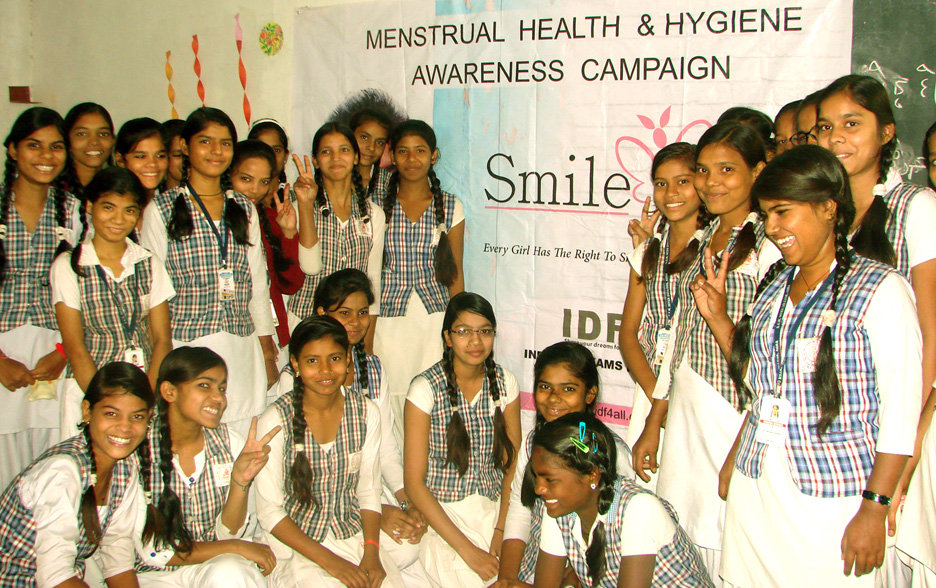By Vernika Shukla | Project Leader
Purpose:
This report contains the review of the campaign ‘Smiley Days’ after phase one of the campaign, during whichIDF has implemented many activities with a view to achieve the primary goals of the campaign.
Introduction:
Hygiene is a fundamental requirement for every healthy human being. While many of us take it for granted, there are a considerable amount of people who do not have access to adequate sanitary facilities. Young girls and women living in slums of Agra (UP), Indiabelong to the latter group. Slums have a number of hygiene issues such as lack of access to clean drinking water and toilets, but women face additional problems due to menstruation.Unhygienic practices during menstruation have a life long impact on these girls. This stems mainly from the prevalent cultural taboos on the topic, which leads to it being considered a subject of silence. Even in a family, there is little conversation on menstruation between a mother and a daughter.
The Smiley Days campaign aims to spread awareness around this taboo topic in the slums of Agra. Its main goal is to address female health and hygiene issues by promoting menstrual hygiene practices among adolescent girls and women in slums, rural and backward communities. The campaign will seek to bridge the gap between assumptions and information on menstruation by imparting knowledge toadolescent girls and providing them with an access to clean toilets. This campaign aims at empowering 4000 adolescent girls directly and impact 10000 adolescent girls and women to take control of their lives through menstrual hygiene management and sanitary practices.
What have we done so far?
In the first phase of the campaign, IDF has implemented a number of initiatives, which are as follows:
During the workshops, we also discussed what girls already knew about menstruation and asked them to share their experiences around the pain, flow and fatigue they experienced during their periods. While the girls were initially hesitant to speak about their experiences, they opened up to the IDF team after some time. The Quiz Card activity was particularly helpful to elicit questions as it allowed them to write any questions they might have about menstruation. This encouraged them to be curious and ask those questions, which they might have been shy to ask otherwise.
We have selected school facilitators in each partner school and have explained their roles and responsibilities under the campaign to them. The school facilitators have been selected on the basis of their dedication, punctuality, andenthusiasm.
10% girls from partner schools have been selected to constitute the Smiley Girls Club and they have been nominated as the Smiley Girls. They are selected on the basis of their regularity in the school, dedication towards the campaign, leadership skills that can motivate or inspire other girls, and knowledge about menstrual hygiene.
We will continue to organize these workshops in the coming months and assessing the impact of these workshops.
Below are a few snippets from the participants of the Introductory Workshop:
# Swati, 14 years old said “I don’t come to school during my periods. I become absent for all five days. I feel shy and uncomfortable to come to school”.
# Priyanka, 13 years said “I refuse to come to school during my periods because I feel discomfort when using pads. Usually I use cloth to absorb period blood but I am afraid if my school uniform could get stained if the absorbing material is not placed properly”.
# Poonam, 13 years asked “I experience white fluid discharge when I don’t have my periods. What is it and why does it happen? ”
A common question that was asked by a lot of girls was, “Do we stop growing after periods?”
Links:
Project reports on GlobalGiving are posted directly to globalgiving.org by Project Leaders as they are completed, generally every 3-4 months. To protect the integrity of these documents, GlobalGiving does not alter them; therefore you may find some language or formatting issues.
If you donate to this project or have donated to this project, you can receive an email when this project posts a report. You can also subscribe for reports without donating.


